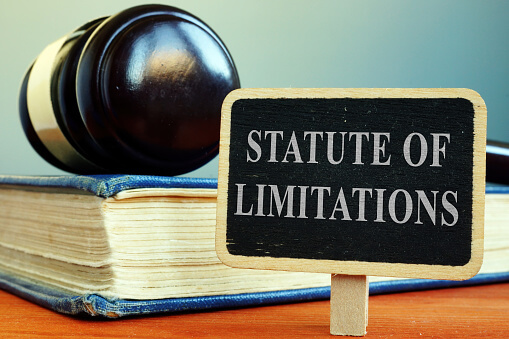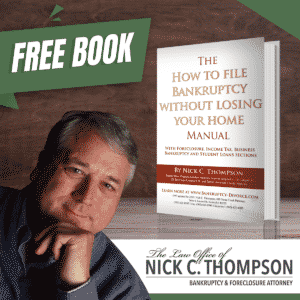Kentucky Debt Collection Statute of Limitation
Recently we were asked a question on Avvo about whether a debt collector can collect on an overdraft checking account after seven years. This person had overdraft charges, and USAA bank was holding him accountable on a checking account on the check.
He asked if there was limited consumer protection in Kentucky state laws that held him accountable after such a long time. Interestingly, this presents two different questions.
- The first question is how long the bank can go after him with collections under the Kentucky Debt Collection Statute of Limitation.
- The second question is if he can get a second checking account.
Kentucky Statute of Limitations for Debt Collection
The Kentucky statute for limitations for a contract written before July 15th, 2014, is 15 years (including medical debt). Refer to Ky. Rev. Stat. § 413.090. But if there is a written contract after July 15th, 2014, the statute of limitations is 10 years Ky. Rev. Stat. § 413.160.
If the contract is a negotiable instrument, it can be sold or given to someone else and enforced. All checks are negotiable instruments. Mortgages and credit card debt is also normally a negotiable instrument that can be sold to another company or debt buyer. When a contract is negotiable, the Kentucky 6-year statute of limitations for negotiable instruments applies Section 355.3-118 – Statute of limitations. This six-year statute of limitations is confusing in that the statute mentions acceleration triggering the statute of limitation. It would seem that taking the IRS deduction for a loss should be an acceleration. Dishonored checks can be sued on for 5 years.
How they extend the Statute of Limitations for 60 years
If someone sues within those 15, 10, or 6 years, the plaintiff will often obtain a judgment. At that point, a judgment can collect for another 15 years, be renewed for another 15, and yet another 15 years. Refer to Ky. Rev. Stat. § 413.090. And that is how a debt collector can collect 60-years later after he obtains a judgment. The statute of limitations can be renewed over and over again by payments on a debt, admissions of the debt or by renewing judgments!
The ability to collect for a contract and renew a judgment over and over for debt collection is why bankruptcy is so important as an option. In most states, if debt collection agencies file a judgment lien against your property, you have to file a bankruptcy to strip the lien or pay it if you wish to sell the personal property. The contract you have with the bank which requires you to pay them is normally not negotiable. It is just a normal contract collectible with a 15 or 10 years statute of limitation. Refer to Ky. Rev. Stat. § 430.120(7) for checks.
Other State Statutes of Limitations
Interestingly, most state statutes of limitations are either three or five years, depending on the state. When a debt is generally not dischargeable in bankruptcy (such as a private student loan), it can be a reason for moving to another state. Statutes of limitations are different for oral and written contracts.
You must look at your state laws to know the statutes of limitations. Every state has its own statute of limitations. For instance, in Indiana, the statute of limitations is ten years for a written contract. Ohio is six years and Florida is 5 years. Debts such as federal student loans have no statute of limitations and can be collected forever. But private student loans are limited by the statute of limitations. DOE can even garnish your social security check for federal student loans. In Kentucky, the statute of limitations on credit card debt is 6 years.
What if a Creditor Continues to Attempt to Collect Debts After the Statute of Limitations?
If a debt collector attempts to collect a debt after the statute of limitations expires, you have a Fair Debt Collection Practices Act (FDCPA) case against the debt collector Debt Collector Harassment. However, an FDCPA case requires that you file a lawsuit against a debt collector within one year. The FDCPA does not apply to a creditor who is just collecting his debt or against someone who only services the debt.
For the FDCPA to apply, the debt must be in default and involve a consumer debt. Not surprisingly, original creditors often attempt to collect the debt years after the SOL (Statute of Limitations) expires. In Kentucky, debt collectors are required to abide by federal laws governing debt collection.
Therefore, it’s imperative you continue to do your research and consult with a bankruptcy attorney. This will arm you against violators of the FDCPA or the bankruptcy stay. Once the SOL passes, you still legally owe money to the creditors but you can not be sued in court.
Therefore, debt collectors won’t be allowed wage garnishments or bank attachments. In the event a debt collector oversteps their legal authority or causes personal harm, you should file a complaint with Kentucky’s Department of Financial Institutions (DFI) or sue under the FDCPA.
How Can you Get a Checking Account After Overdrafts on a Prior Account?
Banks have a special reporting service and generally will not give you another account until you have paid the overdrafts on any prior account with another bank. However, seven years after you overdraft your account, you should be able to get another account with another bank.
In addition, Woodforest and some other banks offer second chance checking accounts that you can get before the seven-year lockout period. So, there are ways around this.
With the exception of very minor cases like bad checks under $300, there is no statute of limitations in Kentucky. In fact, felonies in Kentucky can be prosecuted decades after the criminal act.
Understanding Kentucky Statute of Limitations
Debt buyers purchase these loans in hopes of suing the homeowner. However, these debts already have a lien on the homes. Therefore, the Debt collector believes these old notes and mortgages are collectible, but they are not.
Under Kentucky law, for the mortgage to be valid, the note must be valid. If the note fails, the mortgage fails. Kentucky has a 6-year statute for a negotiable instrument.
Essentially the note in a mortgage is almost always negotiable so that the loan can be insured or underwritten by government programs. If the loan defaults, it can be transferred to the government or insurance carrier.
Normally written contracts before 2014 have a 15-year statute of limitations. Contracts after 2014 have a 10-year statute of limitations. Essentially, these second mortgages are now uncollectible due to the six-year SOL.
Kentucky Debt-Relief Programs
Normally, debt relief programs in Kentucky are administered by Kentucky creditors. For instance, Kentucky Housing Corporation is an important home mortgage lender in Kentucky. When a homeowner has problems and defaults, the homeowner can ask Kentucky Housing for help in debt collections. Kentucky Housing Corporation is owned and run by the State of Kentucky, which funds this corporation.
Kentucky Housing itself has several different programs to temporarily lower the cost of a mortgage other than a mortgage modification. However, the homeowner has to ask about these programs, and they are constantly changing what they offer.
Almost every large lender can be flexible if you ask for different temporary terms. Even finance companies will offer to rewrite (refinance) the loan to catch it up. They may also offer deferment payments where the loan is extended one or two payments, and the debtor pays only the interest on the principle for those one or two months.
Deferment payments are much cheaper at the end of the loan when you owe less in principle. However, nothing provides debt relief from unsecured debt faster or cheaper than bankruptcy.
Tips to Tackle Debt in Kentucky
1. Consolidation
There are other methods to tackling your budget to handle debt collection. Some people find by consolidating their debt; it is much easier to manage their debt. You can consolidate your unsecured debt essentially by filing a Chapter 13 and repaying what you can afford for 5 years. If you have run up a lot of expenses recently due to circumstances such as being off from work for a couple of months, you probably have several small bills overdue. This creates a nightmare problem, but it may be more manageable if you can pay them all off and repay the debt over a longer time with a consolidation loan.
The real problem you have is debt. Consolidation will not help a problem if you have more expenses than income. To consolidate debt, you will often have to finance smaller debts, which often carry no interest. The consolidation loan will often require interest and security, such as a second mortgage.
Remember, debt is the enemy. Consolidation does not eliminate debt. Consolidation often creates an even worse debt problem by charging interest on top of debt and turning unsecured debt into secured debt. This creates a problem bankruptcy can’t cure by changing unsecured debt into secured debt. You must get your expenses back in line with your income to cure the problem.
2. Working with a Credit Counselor
A credit counselor can help you learn to manage debt. We often need to change how we look at income and expenses. About 3% of people have about 90% of the wealth in America. This is not because of any advantage they had. It is because of how they manage their money.
Making small adjustments in how you spend money and look at family finances will allow you never to have money problems again. You can normally solve the problem of unsecured debt very quickly by filing bankruptcy. But unless you learn new, different, and better ways to budget, you will simply return to the same problems until you change.
So yes, a credit counselor can be helpful by learning new money habits. But if you owe 100,000 and make 20,000 per year, no amount of credit counseling can solve the simple math problem.
3. Debt Settlement
If you owe more than you can repay, you might consider debt settlement. You have to either settle these debts for 10%, which most companies will not agree to, or file bankruptcy.
Not all companies will agree to debt settlement. And debt settlement agreements will rarely be for less than 50%. Debt settlement has about the same damage to your credit report as a bankruptcy. Moreover, debt settlement also is more likely to fail than filing bankruptcy.
4. Refinancing and Home Equity Loan
Refinancing a home equity loan will catch up with the mortgage. However, if you need to refinance a mortgage, you are normally behind in payments. Refinancing is often at an increase in the mortgage rate from 4% to 5 %, a huge 25% increase in the monthly payment.
Furthermore, you are also eating up your equity. If you pay off the unsecured debt by refinancing a mortgage, you turn unsecured debt into secured debt. You can discharge unsecured debt easily in bankruptcy.
If you are a Kentucky resident, you must be aware of the Kentucky state laws. You cannot modify a first residential mortgage in bankruptcy. You can often modify or discharge a second mortgage or non-residential mortgage which has no equity.
5. Balance Transfers
Balance transfers only move money from one account to another. Of course, transfer balances if you can save money by transferring money to a lower rate. But if the transfer changes debt from unsecured to secured debt, you are making a mistake.
You have to repay secured debt normally or lose personal property. Unsecured creditors have no way to collect if you have no assets.
Therefore, helping unsecured creditors by converting unsecured debt into secured debt is never a good option. Transferring balances only treats the symptoms of the debt disease. It does not cure debt. You only transferred it and often to a worse creditor.
6. Avoiding Foreclosure
Foreclosure adds bankruptcy attorney fees and court costs to your mortgage debt on top of the penalties and late fees. This is an expense in the thousands of dollars. You essentially use up your equity in the home very quickly at 250 to 500 per hour in attorney fees.
Expect any foreclosure to cost the homeowner 15 to 20 thousand in legal fees at a minimum. The bank’s attorney will charge about 5,000 at a minimum. If you decide to catch up on a mortgage with a Chapter 13, the court will pay your attorney a 4,000-dollar fee.
Moreover, penalties and interest will add an amount, and you can see why a foreclosure will cost you 15,000 at a minimum.
Ignoring the complaint
Not responding to the complaint will mean that the home will sell within 3 to 6 months. Defending it will often delay this for over a year or two. Hiring an attorney to fight the foreclosure can delay one to two years or longer. You can find another home, do a mortgage modification, or sell the home during that time.
Ignoring foreclosure often means the home will sell for 60 to 70% of its real value. You may or may not then have to deal with a deficiency judgment or income tax debt from the amount which was not paid back to the mortgage company.
Steps to Respond to a Debt Collection Case in Kentucky
The failure to file an answer within 20 days often means the debtor loses a lawsuit by default. There are over 100 different defenses that can be raised, and there is no room here to go into each one of the defenses, such as laches, novation, satisfaction, and others.
In the case of a foreclosure, there are additional separate defenses and statutes which allow you to sue the mortgage company for TILA, RESPA, and CFPB regulations. The list does not end with just these defenses. Just one 500-page book would not cover the elements and descriptions of the basic defenses alone.
The experienced trial attorneys who are good at foreclosures are few and far between. You have to be able to spot the errors which debtors simply don’t see and understand. You only get the ability to make the arguments and see the weak spots after thousands of hours of doing the work.
Answer Each Issue of the Complaint
The failure to answer any paragraph of the debt collector complaint means you admit the allegation. It is sometimes possible to correct the damage. But often, you can’t repair the damage or reverse the failure to respond to a complaint or ignore an allegation.
The affirmative defenses are outlined in Rule 8.03. If you fail to assert these defenses in the answer, you lose them. They are accord and satisfaction, arbitration and award, assumption of risk, contributory negligence, discharge in bankruptcy, duress, estoppel, failure of consideration, credit fraud, illegality, injury by a fellow servant, laches, license, payment, release, res judicata, the statute of frauds, the statute of limitations, waiver, and any other matter constituting an avoidance.
Filing the Answer with the Court and Serving the Plaintiff
It is not enough to just file the answer with the court. You must also send a copy of anything you file with the court to the other parties, like the plaintiff. Many offices do this electronically.
However, it can be done by paper and directly mailing the answer or other document to the plaintiff. It is always important to give the other party notice and the opportunity to be heard.
If the plaintiff does not give you reasonable notice and the opportunity to be heard by the court, his judgment may not be valid.
Plus, if you do not give the opposing side notice, your answer or response may not be valid. Be sure always to send a copy of your answer to all parties to the lawsuit by certified mail to have proof they received a copy of your answer and any claims you are making against them.
If you choose to defend against the debt, you will normally have to file the answer. Within 30-60 days after that, the discovery will be due. After discovery, you will need to file a motion for summary judgment or answer a motion for summary judgment.
Seek the Assistance of a Knowledgeable Attorney
I know this seems overwhelming. Make any mistake, and you may find yourself on the fast track to having the home sold or wages garnished from your bank accounts. That is what over 90% of debtors do. They fail to file an answer and defend against the debt. They then lose the case and often lose the property.
This is a situation where one side wins, and the other loses in the thousands of dollars. This may be a difficult concept to comprehend if you make an attempt to do so, and I could easily write books about what this article does not include.
The lucky thing is that you don’t have to understand the chess game in 3D with billions of possible variations. You just need to win to protect your bank accounts from wage garnishing. That is why you should hire the best bankruptcy attorney you can find within your budget.
 Resources for Bankruptcy
Resources for Bankruptcy
Louisville, Kentucky Bankruptcy Forms
How to Stop Federal Student Loan Wage Garnishment • Video
Bankruptcy Filing Time Limitations
The FDCPA and How to Handle a Debt Collector • Video
Kentucky Statute of limitations
Debt Settlement Company vs. Debt Settlement Attorney
If you are thinking about filing bankruptcy, don’t delay because timing is crucial. I am here to help you. So, contact my office right away to start the conversation—Nick C. Thompson, Bankruptcy Lawyer: 502-625-0905.





